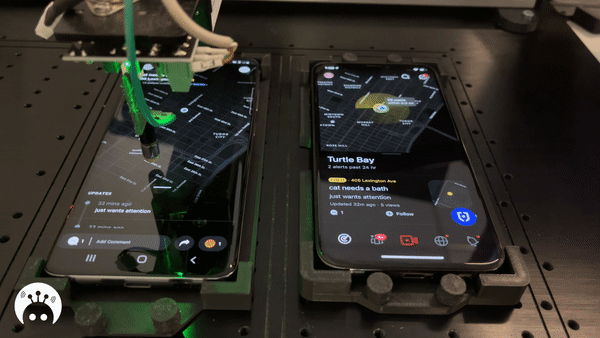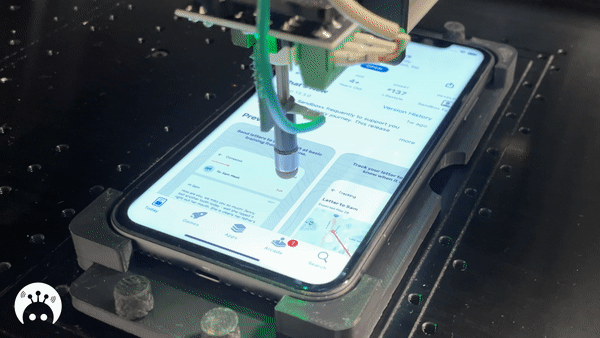Mobile apps have to be bug-tested across countless devices to ensure they work as intended. Users don’t look kindly on poor experiences — 88% say they’ll abandon apps based on minor glitches, according to software testing vendor Qualitest (which admittedly has a horse in the race). Testing is a time-consuming and expensive process, with 31% of app development firms in one poll estimating expenses at between $5,000 and $10,000. And to some outfits, the highest-quality testing simply isn’t available, either due to logistics reasons or the relentless push to reach release.
Eden Full Goh hopes to change that — and to make money doing so. She’s the founder of Mobot, a startup building what Full Goh claims is the first “infrastructure-as-a-service” platform that lets developers use physical robots to automate app testing on devices. Bucking the macroeconomic trend, Mobot this week closed a $12.5 million Series A round led by Cota Capital with participation from Heavybit, Uncorrelated Ventures, Bling Capital and Primary Venture Partners, bringing the company’s total raised to $17.8 million.
Previously a product engineer at Palantir and medical device company Butterfly Network, Full Goh had the idea for Mobot after seeing what she describes as “bottlenecks” in the mobile app testing process. Most companies — her former employers included — recruit employees or third-party contractors to perform manual testing, which tends to be inefficient, costly and error-prone, she says.
“There are tools developed by companies like Applitools, Test.ai and others that leverage existing emulated testing frameworks to automate testing for mobile apps. However, the unfortunate reality is that many defects often slip through the cracks of software-based, emulated testing because it doesn’t accurately represent testing on real hardware,” Full Goh told TechCrunch in an email interview. “Presently, Mobot is not positioning ourselves as a competitor or replacement for emulators and automated testing. Rather, our goal is to replace the inevitable manual quality assurance that everyone is still having to do and will increasingly have to do as device fragmentation grows in the next five to ten years.”

It might sound novel, but robotics have been used to test mobile device software for quite some time. Tokyo-based Japan Novel Corp. once offered a robot that can simulate the process of flicking and tapping on a smartphone touchscreen over and over again. T-Mobile built a similar robot in-house, dubbed Tappy, to stress-test different phones and tablets before they went to the carrier’s outlets.
However, these types of machines tend to require a high initial investment, according to Full Goh — not to mention robotics expertise.
By contrast, Mobot abstracts the maintenance and upkeep away, letting customers set up a test case simply by recording a video on the app and device (or devices) to be tested. A customer success manager helps to develop a test flow and integrate Mobot’s analytics into dev tools like Jira, and then a fleet of robots and a library of more than 200 differnet mobile devices leveraging computer vision will execute the aforementioned test case — tapping, swiping and rotating app-running devices, as well as connecting the devices to Bluetooth peripherals, having them receive push notifications and more.
When the testing wraps up, the Mobot team records the results. Customers can view side-by-side reports using a self-service tool.
“As far as we’re aware, there are very few companies focused on physical quality assurance because the tech stack is quite different from their core proposition for web- and browser-based testing,” Full Goh said. “Our biggest competitors are actually crowdsourced and outsourced manual testing services offered by firms like Applause, Infosys and Qualitest, because manual testing is the most similar to the automated physical testing Mobot does … Mobot protects the entire mobile app customer journey, which is impacted by missed bugs — from user acquisition (e.g., deep links, registration flows, onboarding), retention and engagement (push notifications and crashes) to monetization (checkout and in-app purchases).”
Mobot claims to have run thousands of test cycles since its founding in early 2018, collecting millions of screenshots from the apps it’s tested. Early adopters include big names like Citizen and Mapbox, as well as Branch, Radar, Persona and around 45 others, according to Full Goh.
There’s some competition, like Finnish firm OptoFidelity, which provides robot-assisted testing for touch displays and infotainment systems. But Mobot doesn’t plan to stop at apps. In the next few years, the goal is to use the data that the company has collected to deliver product insights and “exploratory testing features” to customers, Full Goh says. Beyond that, Mobot is building a testing framework to evolve with technological advancements in augmented reality headsets, smartwatches and yet-to-come-to-market products like smart contact lenses.
Is robotics-based testing a scalable idea? Robots break down, after all, and Mobot is keeping its financials close to the chest for now. (Much of the company’s operations are shrouded in secrecy, ostensibly for competitive reasons; Mobot’s public website doesn’t show images of its robots.) But Full Goh gives the impression that she sincerely believes in the model, particularly as the market for peripherals like heads-up displays is poised to grow.

“In the next two to five years, software will become increasingly mobile- and connected device-centric,” Full Goh said. “We envision autonomous robot warehouses in the middle of nowhere — where real estate is affordable — filled with thousands of robots that are capable of testing any physical action that a human would do to a product: tapping, swiping, shaking a device, pressing buttons, scanning a QR code, capturing a photo, listening, speaking and more.”
In the nearer term, Mobot will use the proceeds from the latest funding round to expand its sales, marketing and engineering teams, increasing the overall headcount from 42 employees today to 50 by the end of the year. While the tech industry implements hiring freezes and workforce reductions, it helps that Mobot is a “counter-cyclical” business, Full Goh asserts. She says demand for quality assurance testing in the mobile space hasn’t waned as companies continue to ship new apps and updates to existing apps.
“There [is no] offering on the market to democratize physical testing for the everyday software engineering team that would never have the expertise to build a robot fleet themselves,” Full Goh said. “Mobot is a business-critical and cost-efficient solution to streamline a tech company’s product development process.”































Comment